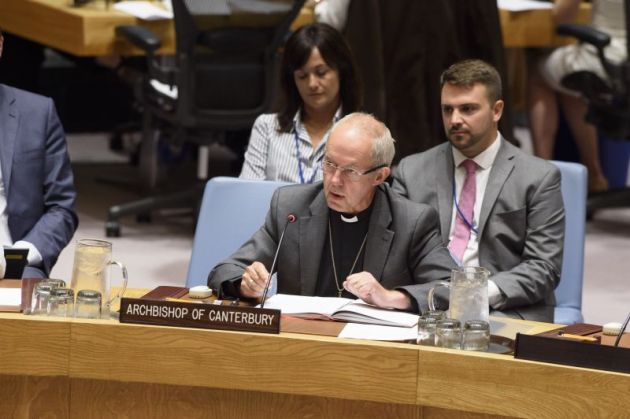Archbishop of Canterbury, Justin Welby, to step down over Anglican church abuse scandal

The Archbishop of Canterbury, Justin Welby, has announced he will step down after facing pressure to quit over his handling of an abuse scandal.
Welby made his announcement on Oct. 12, citing a report known as the Makin Review which "has exposed the long-maintained conspiracy of silence about the heinous abuses of John Smyth," a prolific child abuser.
"When I was informed in 2013 and told that police had been notified, I believed wrongly that an appropriate resolution would follow," said Welby in his statement.
"It is very clear that I must take personal and institutional responsibility for the long and retraumatizing period between 2013 and 2024."
Welby said the exact timing of his departure would be decided once a review of necessary obligations has been completed, including those in England and in the worldwide Anglican Communion, of which he is the symbolic head.
"I hope this decision makes clear how seriously the Church of England understands the need for change and our profound commitment to creating a safer church. As I step down I do so in sorrow with all victims and survivors of abuse."
The report found the police referral had not been made, but that it was "reasonable to conclude" that Welby received the assurance, the BBC reported.
It also found Welby should have made further attempts to pursue the matter.
The second most senior bishop in the Church, the Archbishop of York Stephen Cottrell, says he admired Welby for stepping down and that the church made "real progress" in safeguarding under his leadership, according to the BBC.
A damning independent review published last week found Welby - the most senior bishop within the Church of England - and other church officers should have formally reported Smyth in 2013 to police in the UK and authorities in South Africa.
ACCUSATIONS AGAINST SMYTH
Smyth was accused of attacking dozens of boys, including those he met at Christian camps, in the UK in the 1970s and 1980s.
The lawyer and senior member of a Christian charity then moved to Zimbabwe and later South Africa, where he abused up to 100 boys aged 13 to 17, the Makin review added.
By 2013, the Church of England "knew, at the highest level" about Smyth's abuse, including Welby who took up the church's top job that year.
If Welby and other church officers had reported this to police in the United Kingdom and authorities in South Africa at that time, "John Smyth could have [been] brought to justice at a much earlier point," the report said.
Smyth died aged 75 in Cape Town in 2018 while under investigation by Hampshire Police in the UK.
Welby said, "The last few days have renewed my long felt and profound sense of shame at the historic safeguarding failures of the Church of England. For nearly 12 I have struggled to introduce improvements. It is for others to judge what has been done."
Smyth, a former advocate, is said to have subjected as many as 130 boys and young men to traumatic physical, sexual, psychological, and spiritual attacks across five decades in the UK and southern Africa.
A petition by members of the General Synod - the Church of England's parliament - received thousands of signatures calling for Welby to step down, LBC reported.
The Telegraph newspaper commented, "There have been some grisly ends down the centuries for holders of the great ecclesiastical office of Archbishop of Canterbury, not least for Thomas a Becket, Thomas Cranmer, and William Laud. Until the 20th century, most occupants died in harness, before it became usual to retire, as is now required by the age of 70.
'IGNOMINIOUS DEPARTURE'
"But Justin Welby is the first to be forced out for non-ecumenical reasons since the Norman Conquest. It is an ignominious departure for a cleric whose arrival at Lambeth Palace in 2013 was greeted with some relief after the rarefied tenure of Rowan Williams."
The newspaper noted that as a former oil company executive from the evangelical wing of the church, Welby was seen as "just the sort of managerial figure needed to steer it away from the rocks of controversy in a rapidly secularising world, whether it be dealing with gay marriage or female bishops."
World Council of Churches general secretary Rev. Jerry Pillay said, "We commend his wisdom to take personal and institutional responsibility for the silence and inability to address the heinous abuses committed on children.
"Our hearts and thoughts go out to the victims and families of those abused."
Pillay extended prayers that the emotional scars and wounds you have suffered over the years may find God's healing, peace and justice.
"Our prayers are also with the Church of England as you go through this difficult time and transition in leadership," he said.
